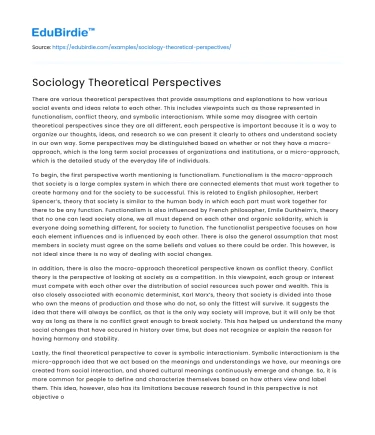There are various theoretical perspectives that provide assumptions and explanations to how various social events and ideas relate to each other. This includes viewpoints such as those represented in functionalism, conflict theory, and symbolic interactionism. While some may disagree with certain theoretical perspectives since they are all different, each perspective is important because it is a way to organize our thoughts, ideas, and research so we can present it clearly to others and understand society in our own way. Some perspectives may be distinguished based on whether or not they have a macro-approach, which is the long term social processes of organizations and institutions, or a micro-approach, which is the detailed study of the everyday life of individuals.
To begin, the first perspective worth mentioning is functionalism. Functionalism is the macro-approach that society is a large complex system in which there are connected elements that must work together to create harmony and for the society to be successful. This is related to English philosopher, Herbert Spencer’s, theory that society is similar to the human body in which each part must work together for there to be any function. Functionalism is also influenced by French philosopher, Emile Durkheim’s, theory that no one can lead society alone, we all must depend on each other and organic solidarity, which is everyone doing something different, for society to function. The functionalist perspective focuses on how each element influences and is influenced by each other. There is also the general assumption that most members in society must agree on the same beliefs and values so there could be order. This however, is not ideal since there is no way of dealing with social changes.
Save your time!
We can take care of your essay
- Proper editing and formatting
- Free revision, title page, and bibliography
- Flexible prices and money-back guarantee
In addition, there is also the macro-approach theoretical perspective known as conflict theory. Conflict theory is the perspective of looking at society as a competition. In this viewpoint, each group or interest must compete with each other over the distribution of social resources such power and wealth. This is also closely associated with economic determinist, Karl Marx’s, theory that society is divided into those who own the means of production and those who do not, so only the fittest will survive. It suggests the idea that there will always be conflict, as that is the only way society will improve, but it will only be that way as long as there is no conflict great enough to break society. This has helped us understand the many social changes that have occured in history over time, but does not recognize or explain the reason for having harmony and stability.
Lastly, the final theoretical perspective to cover is symbolic interactionism. Symbolic interactionism is the micro-approach idea that we act based on the meanings and understandings we have, our meanings are created from social interaction, and shared cultural meanings continuously emerge and change. So, it is more common for people to define and characterize themselves based on how others view and label them. This idea, however, also has its limitations because research found in this perspective is not objective or open minded. It also does not support the social structures commonly found in most societies.
With all of this in mind, the theoretical perspective I find most convincing is functionalism. I feel this way because I do think of society as a system that only functions well if everyone does their own individual parts. We can’t have everyone doing the same jobs, being of the same race, or having the same personalities because then there would be no progress and everything would be the same in society. Instead, it is important for everyone to have their own designated roles so there is diversity and growth. Also, I believe in the idea that no one could lead society alone, we all have to work together based on the same beliefs and values to create a community for everyone.
In final analysis, the three major theoretical perspectives in sociology are functionalism, conflict theory, and symbolic interactionism. Functionalism focuses on everyone having their own role and working in harmony, conflict theory is looking at society as a competition where there is only survival of the fittest, and symbolic interactionism is the belief that we act based on the meanings and understandings we make through social interaction. Although they are all different in their own ways, each play a significant role in the way we view ourselves and our own society today. That is why it is still important to know and identify them today.






 Stuck on your essay?
Stuck on your essay?

